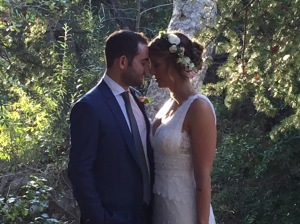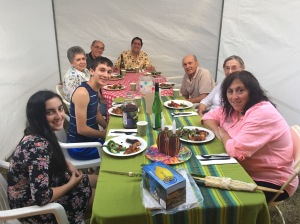by Rabbi Wendy Spears
The Reconstructionist Rabbinical College recently decided to admit students to study for the rabbinate who are either married to or in a serious relationship with a partner who isn’t Jewish. There has been quite an uproar in the various Jewish-themed periodicals about this decision. It is a very emotional exchange and a theme about which the Jewish community continually wrings its hands.
Intermarriage, in and of itself, is not a predictor of the Jewish person’s commitment to Judaism. There are many intermarriages where Judaism is the culture and tradition chosen by the family. Just because a Jewish person marries someone who isn’t Jewish, doesn’t mean they intend to abandon their Judaism. But studies have shown that in other intermarried families, Jewish identity becomes diluted or abandoned. I have met more than a few Jews who intentionally and specifically choose a partner who isn’t Jewish as a way to separate themselves from the formal Jewish community. Ironically, it is sometimes the non-Jewish spouse who is more interested in Judaism and feels cheated that their Jewish partner demurs from helping guide them in.
What intermarriage does indicate, is that Jews have finally broken out of the ‘ghettos’ in America. Over the last 50 years, Jews have become Americans and other Americans have no problem marrying Jews. It is also true that the Reform movement in Judaism accepted intermarriage as a reality in 1983. The phenomenon has continued to grow in the past 32 years. Few, if any, Jews are grieving when their children marry people who aren’t Jewish.
There are a great many “born” Jews who have grown distant or abandoned any Jewish practices, even when they are married to Jews. I recently heard from the father of a bar mitzvah student whose ceremony is scheduled in three weeks. This is a success story – right? This family used to be a member of a synagogue a few years ago. When I asked what happened to their other rabbi for the private service, I was told that they hadn’t yet contacted a rabbi. The father then proceeded to tell me that they didn’t want Hebrew in the ceremony since no one would understand it; that they didn’t want any Jewish songs since no one knows them; that they didn’t want the ceremony to be too long because everyone would be bored; and that the student should do everything involved in the ceremony because this will be his day and everyone knows him. For this family, Judaism is incomprehensible and boring, yet they still feel tied enough to the culture to want their son to make a statement about his Jewish identity. But what example are they setting for him?
This is the larger question: why do so many Jews find Judaism no longer compelling as a way of life? Address this question and you also go a long way in addressing the challenges posed by intermarriage. I’ll explore this more in my next post.
#intermarriage #interfaithwedding #patrilinealdescent
Rabbi Wendy Spears is a community rabbi in Los Angeles. Find her at http://www.rabbiwendy.com and LIKE her Facebook page at Interfaith Wedding Rabbi – Rabbi Wendy Spears.









